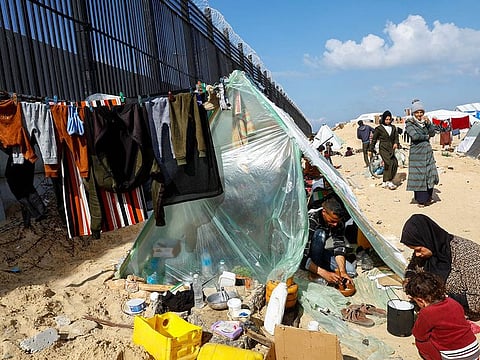Exodus from Gaza and its dangerous implications
Advancing towards a two-state solution represents a pathway to stability, justice

The current critical situation in Rafah, Gaza, and the potential displacement of over a million Palestinians into Egypt highlights several intricate and long-standing challenges that have hindered the Palestinian quest for self-determination and regional stability.
The escalation of violence in Gaza, fuelled by intensified Israeli military operations and the impending threat of a ground offensive in Rafah, not only worsens an already dire humanitarian crisis but also substantially diminishes the likelihood of achieving a peaceful resolution to the conflict in the near future.
The humanitarian ramifications of displacing over a million Palestinians from Gaza into Egypt are immense and cannot be overstated. Such an action would lead to immediate and severe humanitarian consequences, while also casting long shadows over the future prospects for peace in the region. This displacement would exacerbate the already dire humanitarian crisis, imposing an unsustainable burden on Egypt and further destabilising an already volatile region.
Moreover, this potential mass exodus would resonate with the historical trauma of the Nakba, where nearly 700,000 Palestinians were displaced during the conflict that accompanied the establishment of Israel in 1948.
Last week, the International Court of Justice issued a statement on the situation in Rafah, noting that any developments would “exponentially increase what is already a humanitarian nightmare, with untold regional consequences.”
Additionally, Filippo Grandi, the United Nations High Commissioner for Refugees, has emphasised the catastrophic implications of such displacement, not only for Palestinians but also for the broader peace process in the Middle East. Reflecting the severity of these concerns, Egypt’s preparations for a potential influx of Palestinians, despite official denials, underline the gravity of the situation and the anticipated challenges it would pose.
The strategic and historical importance of Rafah, situated at the juncture between Gaza and Egypt, is profound. This area has consistently been at the centre of conflict and humanitarian issues, particularly because of its significance as a crucial crossing point for Palestinians.
Israel’s rationale for its military operations in Rafah not only pose immediate threats to civilian lives and infrastructure but also jeopardise the long-term feasibility of achieving a two-state solution.
Key frameworks for peace
The consideration of pushing Palestinians into Egypt as a component of Israel’s wider strategy to mitigate security concerns presents a direct challenge to the 1979 Camp David Accords, the landmark peace agreement that established normalised relations between Egypt and Israel. A significant deviation from this treaty could dismantle one of the key frameworks for peace and cooperation in the Middle East.
Arab League Secretary General Ahmed Aboul Gheit has pointed out that Israeli actions could jeopardise the continuity of agreements with Egypt and Jordan, highlighting the considerable regional implications tied to the conflict and the management of Palestinian refugees. Although Egypt’s Foreign Minister, Sameh Shoukry, reaffirms Egypt’s dedication to the 1979 peace treaty, he also stresses its reciprocal nature.
Israeli Prime Minister Benjamin Netanyahu’s interest in asserting control over the Philadelphi Corridor, a crucial zone separating Gaza and Egypt, has intensified existing tensions. The situation underscores the delicate balance between addressing security concerns and maintaining vital peace accords that have contributed to some stability in a region fraught with conflict.
Moreover, the conditions in Rafah, where Palestinians endure severe and inhumane circumstances amid ongoing military operations and threats of widespread expulsion, accentuate the pressing necessity for a multifaceted strategy that tackles both the immediate humanitarian requirements and the fundamental political challenges.
The response from the international community, marked by appeals for restraint from both the United States and China, coupled with Egypt’s endeavours to mediate and offer humanitarian aid, underscores a broad acknowledgement of the situation’s capacity for further deterioration and its consequential impact on the prospects for peace.
A critical point
The situation in Rafah has reached a critical point, characterised by extreme overcrowding, rampant disease outbreaks, and a profound scarcity of humanitarian assistance, all of which are further aggravated by Israeli blockades and assaults on United Nations Relief and Works Agency (UNRWA) facilities. This context underscores the urgent necessity for measures that effectively balance security concerns with the imperative to protect human rights and uphold international humanitarian standards.
The looming threat of displacing over a million Palestinians from Gaza into Egypt not only portends a humanitarian catastrophe but also marks a profound regression for a peace process that is already on the brink of collapse. The region’s fraught history with mass displacement and conflict necessitates a sophisticated, ethical strategy that elevates the safeguarding of civilian lives, the strict observance of international law, and the ambition for a fair and lasting resolution to the Israeli-Palestinian dispute.
It is imperative that the global community, spearheaded by influential nations such as the United States, China, and Egypt, escalate their diplomatic initiatives to forestall any further displacement, cater to the urgent necessities of those ensnared by the turmoil, and breathe new life into the quest for peace. Advancing towards a two-state solution not only represents a pathway to stability but also embodies a commitment to justice and human dignity in a region long shadowed by conflict.




